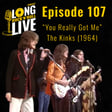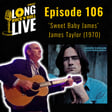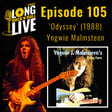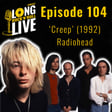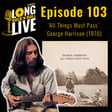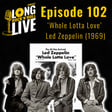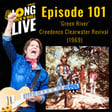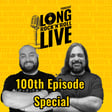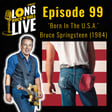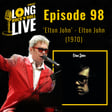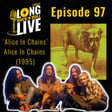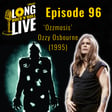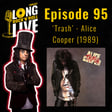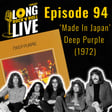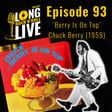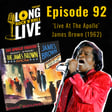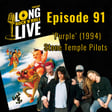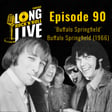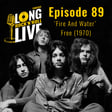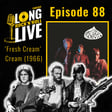Become a Creator today!Start creating today - Share your story with the world!
Start for free
00:00:00
00:00:01

87. ‘Rock ‘N’ Roll’ - John Lennon (1975)
In 1975, legally required to record 3 songs for borrowing lyrics, John Lennon set out on a cathartic project to put his own spin on a collection of rock ‘n’ roll classics from the 50s and 60s. In a chaotic studio environment, these 13 cover songs were produced by Phil Spector and represented a nostalgic trip down memory lane for Lennon in what would be his final solo studio album - recounting and recalling the music that inspired him before fame, fortune and beatlemania took over.
Episode Playlist: https://open.spotify.com/playlist/3fzRCFb3gQybvi9pwxTdBF?si=3678321331ba4648
#JohnLennon #RockNRoll #TheBeatles #LongLiveRockNRoll
Transcript
Introduction and Co-Host Introduction
00:00:00
Speaker
Hello and welcome back to the Long Live Rock and Roll Podcast.
John Lennon's 1975 Cover Album: Context and Creation
00:00:04
Speaker
In 1975, legally required to record three songs for borrowing lyrics, John Lennon set out on a cathartic project to put his own spin on a collection of rock and roll classics from the 50s and 60s. In a chaotic studio environment, these 13 cover songs were produced by Phil Spector and represented a nostalgic trip down memory lane for Lennon in what would be his final solo studio album.
00:00:29
Speaker
recounting and recalling the music that inspired him before fame, fortune and Beatlemania took over.
Discovering Lennon's Album
00:00:35
Speaker
Joining me to discuss this cover album, which it is, is my co-host, Mr Felipe Amriam. How are you doing, man? Doing great, man, and you? Yeah, very well. Thank you very well. um Now, the first time you told me about this album, we were I think we were on tour together, and I'd had no clue that an album like this had been done or released or you know just put out into the world because when you think you know obviously when you think of the Beatles obviously they've got their their list of albums they're very prominent they're very big they're very famous and then John Lennon's got his as well and Paul McCartney's got his and George Harrison's got his
00:01:10
Speaker
None of them did a cover album full of rock and roll
Lennon's Unique Contribution to Rock Covers
00:01:13
Speaker
songs, did they? Except John. they Paul mcgoten McCartney did one later on, which we should cover as well. We should talk about that one. He did it after John did it. Yes, called Run Devil Run. But that was like, ah ah is it 90s or early 2000s? That's like way more recent than this one. He hasn't done it like where all the when all the Beatles were still alive. no Yeah.
00:01:36
Speaker
Yeah, excellent stuff. that That is a unique project for a beetle, you know, it is. Yeah. And it just it takes you by surprise, man. And I remember listening to this. You know, I got the fields outside our house. I remember you we came back from tour and you told me to listen to it and I'd go on my walks around the field and I listened to it. And it's just brilliant.
00:01:53
Speaker
um But first off, why don't you tell us how the album came
Lawsuit and Album Production
00:01:56
Speaker
about? So for for viewers and listeners, this is a Felipe chose this album and we're kind of doing it a bit lighthearted today, aren't we? you know it's not This isn't one of the albums like, you know, Sergeant Pepper or Dark Side of the Moon where we need to talk about its incredible effect on the music industry. No, this is just a really cool cover album done by a really cool guy. um And that's what we're going to do today. So why don't you tell us how the album came into being?
00:02:19
Speaker
Well, yeah, the story behind behind the album is actually, um it's it's a lawsuit against John Lennon's. and i guess ah he recall well When he wrote Come Together, the song's got some some lines or just one line from check a Chuck Berry song called ah You Can't Catch Me, which is in the album, yeah by the way. and And I have a point about that one, which I'm gonna say later. So so the the lyrics and the melody resemble that song.
00:02:45
Speaker
And so he got this this lawsuit. And um he so he got into an agreement with the guy who owned the copyright as a show business kind of guy like manager called Morris Levy. And he sued John Lennon and said, look, if you record three of the songs that three of my songs, meaning ah songs that he owned the copyrights for, that I'm going to make some money out of it. So he just recorded three of the songs that I own, and that's it, it's all sorted. But Lennon didn't know what to do about that because he was like all the all the albums he was doing is about personal stuff and his own views and
00:03:20
Speaker
ah about the world and and life and it's been and you know everything else. And he was like, I don't want to just sing cover songs. yeah And he tried to squeeze one song just like his snippet of stuff, like a little bit of it in um in and in an album that was recorded pretty much at the same time as this one. ah But Morris Levy wasn't happy about this. I want three whole songs.
00:03:41
Speaker
And then Lennon ultimately decided to do a whole album of covers because otherwise it wouldn't make any sense to just squeeze more songs in in his other
Lennon's Personal Struggles and Nostalgia
00:03:50
Speaker
project. So it did not start as something that Lennon wanted to do. No, he still wasn't happy, was it, as it went on until he started. And by the way, so there's there's an interesting ah ah moment of his life ah because he was and he wasn't with Yoko at that point. They were like,
00:04:08
Speaker
were separated for a bit and and he was just drinking a lot and and and not being really productive in terms of music. So so the album came about as a um as an expression of of his you know teenage years, isn't it? It was back to the rock and roll lifestyle, ah drinking and having fun and and and that was actually a problem for the album but yeah we'll get to that later yeah um i think yeah so you touched on everything about the lawsuit uh i don't think i have anything on my nose to add except from the point that john lenon didn't want to do this but he went with it and i'm just i i suppose i'm amazed
00:04:50
Speaker
of how he can turn something negative into something positive because he's gone and obviously he's been sued. And you you can hear it. I mean, you said you want to talk about it later, but you can hear the line. Like when I first listened to it, I was like, that does sound like come together and then you can hear it. So, you know, we'll talk about it later.
00:05:08
Speaker
but I think to to to be in a situation where you've been like, right, I've screwed up, I'm going to have to do this to make this guy happy. But on top of that, why don't I run with this and make a bit of have a bit of fun with it? And to go back and dig into his youth and to look back at the songs that made him and the Beatles what they became 15 years later, I think it's just really impressive to sort of take that hit and roll with it.
00:05:33
Speaker
Yeah, I think I think he did a great job out of that, like ah unusual circumstances, isn't it? like So you don't want to do the project, you have to do it as a legal obligation somehow. And then i say, OK, how can I make the best out of it? And and it's the only album that he he he sounds like.
00:05:50
Speaker
kind of relaxed. I think John Lennon always sounded like worried about something or struggling or suffering and his album is just him having fun. I think he really felt like he was back, ah back in time and singing. So the pictures we got for the background in the show, like I've got a one of John with the guitar and you got John, ah It looks like it's in a club or a house somewhere. and They're both are taken in Germany, those pictures, and and yours is the the album cover, isn't it? It's kind of, and yeah. Yeah, so he wanted the album cover to be, ah to to to reference that time in his life where the Beatles were playing Hamburg in Germany. So I think they were playing those songs. So there's none of those songs were like new to John, like yeah that was the soundtrack of his teenage years really.
00:06:39
Speaker
Yeah, excellent. I think i think the cover, he said it wanted to he said he wanted it to be an understated, a relaxed look back and you know the fact that he... the The fact that there's a picture of him from the early 60s or the late 50s on the album cover is just, just cements the fact that this is a nostalgic piece of of art for him. so it's It's like something like he he was doing something else, which is the album Walls and Bridges. ah He wanted to do that project. And this is something like, okay, it's like getting into a time machine, going back in time and doing something for a couple of months and then coming back. But I feel like we saw that as well with the last Beatles album, um which what's that called um ah called? The one with Let It Be. let be of course That is a great album. And when you hear the album before, which is Abbey Road, wrote and it's very, I don't want to say progressive, but they're using lots of technological stuff. The chord choices are unusual. There's some
00:07:38
Speaker
three songs that run one into another. Some longer songs as well. Yeah and with Let It Be they just they went back to their roots some good old rock and roll obviously you've got some songs like The Long and Winding Road which is an advanced piece of music you know they wouldn't have written that back in the early 60s but they did kind of go back to the beginning and just sort of look at it and I love that John's done this again but to to a much more direct extent he hasn't gone back listened to the songs he liked as in his youth and said I'm going to write music like that he's just covered them and I think it's really cool and it's important because This is one of the earliest albums dedicated to covering classic rock and roll songs. Just straight up, as in, you know, we know that Little Richard and Elvis Presley, they would be covering other people's songs most of the time, yeah but it's not the same, especially when you hit the mid-1970s, because bands are writing original music. um You know, the album has been established by the Beatles in 1965, Rubber Soul. People now understand that artists and their music is a,
00:08:37
Speaker
is a part of them which is why obviously you have so much original music in that time and a good original rock music. Rock and roll as a genre was falling out of favour with the fans because you had this sort of glam rock was coming, disco was coming, pop was going a lot more electronic and synthy, you had Zeppelin and The Who sort of moving rock along. Rock and roll was sort of starting to to dwindle a little bit and I just love that John Lennon had the the courage to be like No, do you know what? I'm going to reconnect with my influences and inspirations and go back to the roots of rock and roll. Yeah, he had to do it, but he um he did it really well. It wasn't just the obligation, I guess, at the end. I think that's why I'm saying he's just he's just made something really good out of something that might have been a shitty situation at
Phil Spector's Chaotic Influence
00:09:20
Speaker
the start. yeah there There's something about the ah the first part of the album, because basically the album was recorded in LA and New York, wasn't it? So because they have the l LA um session musicians, some of the best and most expensive musicians available.
00:09:33
Speaker
and Phil Spector was was called to produce the album and he was famous for his wall of sound production style which is ah like over layering instruments like like you do you have three four guitars doing the same thing to make it sound bigger and mean it's it's a complex ah concept altogether we're not going to get into that but Lenon wanted him to produce and he said with those words I just want to sing For the first time, he didn't want total creative control yeah and tell the musicians what to play. He did not want that for the first... but Well, ah as a starting point, ah it wasn't the idea. I think he had to take over for the second half of the recordings in New York and kind of... Well, let's talk about them now then. what So these were, as I mentioned in the intro, these were chaotic recording sessions. yeah I'm going to list a few reasons why.
00:10:26
Speaker
So first of all, as Felipe said, this was this was recorded in the period known as the Lost Weekend, where he was actually separated from Yoko Ono. um And this involved partying very, very hard with his musician friends. Who did I read? Harry Nilsson, Keith Moon.
00:10:43
Speaker
uh ringo star of course yeah so he they were all there moon is in involved it can't be it's just like one of those names when you read that on the guest list you're like okay this is going hard um but now the other factor that you mentioned was phil specter who is a wonderful producer but an erratic and uncontrollable man and a human being um his attitude and commitment was let's Let's say questionable. He was always late. ah He left musicians waiting for hours. Sometimes he'd just disappear without an explanation. ah showing up you know there's There's even one story that he showed up to the session armed with a gun.
00:11:20
Speaker
And he fired the gun. Yeah. And he fired the gun into the ceiling, terrifying the musicians. Health and safety wasn't a thing, was it? Can you imagine? Can you imagine? But here's the best part. There's a there's a there's a story that he pointed the gun at John Lennon and John Lennon said, you know, I'm going to try and do a Lennon accent. It's kind of like this, the Lennon accent. No, it's not very good. Oh, my name's John Lennon. Oh, I go for that. He goes, Phil, Phil, if you're going to kill me, at least let me finish the album.
00:11:51
Speaker
<unk>s So apparently they're in the studio. Phil Spector's got a gun pointed at John Lennon and John's like, for fucks sake, Phil, could you just let me finish the album, please? and That was more Manchester than Liverpool. Apologies for that, if you remember. That's fine. Anywhere in the north it would do for me. Sorry. Yeah, exactly. Yeah. Yeah. Well, did we say when we were on tour, we had that joke that was like, where are we going north or accent north? Accent north. Yeah. Because being from London, but you know, if you listen around the world and you're not from the UK,
00:12:19
Speaker
um Felipe Lewis in London and to him anything north of like Bedfordshire so between Bedfordshire and Birmingham that's north but but then when you go above Birmingham it's accent north because it's just you just can't understand what anyone's saying anyway like um but after following all this stuff after all the sessions were done did you know Phil Spector ran off with the tapes?
00:12:42
Speaker
Yeah, the thing that happened was he he i think he was really up upset that the project wasn't going anywhere. That's the other like, really rock and roll aspect of the album. They were not getting anywhere with the album. So Phil just took the tapes with him and fucked up. And so um yeah yeah, so so and and ah ah I think I think it was like a few days after that he was involved in a car crash, wasn't it? Oh, I didn't know that. Yeah. And then he was in calmer. So Oh my god, well I obviously missed the part out yeah because I've got in my notes a few months after the a few months after that happened, it took a lot of time, a lot of legal stuff and a lot of effort for John Lennon to retrieve the tapes.
Completion and Impact of Lennon's Cover Album
00:13:23
Speaker
and When he did get them back some of them were unusable so he basically scrapped what he couldn't use and started again.
00:13:30
Speaker
you know in in essence he got some new musicians and he saw just he had stuff he could use but he just built on it and created more stuff didn't he yeah exactly so the thing is he apparently there was there wasn't much from from the early tapes when they finally recovered the tapes there was not much ah usable um recording so he had to start some stuff from from scratch I think there are a few things from from the the early record. But the initial concept is lost, which is like, I have a producer, I'm just going to turn up and sing. That's it. He's in charge of everything. I think Leno had to be in charge. So he was doing another album, Walls and Bridges, and which is his you know his music, his own thing. And he took that crew from the album, the New York musicians and and engineers and everything else, and used them to finish this album. So you have a little bit of LA, a little bit of New York,
00:14:26
Speaker
And a little bit of Phil Spector as a producer and a little bit of Lennon as a producer. So, because he helps take over and and make it work. Then that's kind of a turning point for him.
00:14:37
Speaker
Because like, wait a minute, I need to get my life back on track. I can't just keep partying all day. If I want to get some music out there, I need to behave properly. I need to, you know, do things properly. Yeah, do things properly. Work hard and finish the album. It's a miracle that the album even exists. but Thank God it does. Right. Yeah. and Excellent. Okay. So what else have we got to talk about? I mean, so that the final I mean, hold on, we've got two things. You want to talk about Lennon's personal life. Have we done that? Or are we talking about the party? Yeah, we I want to talk about what happens after as well. Yeah. OK, it's basically that. Yeah, go there go for it. You take us where you are. So basically, this' this change of lifestyle happened after the album. So ah that was 1975. We only released one more album after this, wasn't it?
00:15:24
Speaker
yeah with Yoko, it's not a solo album and it's you know it's it's something completely different and he wanted to you know spend more time at home and be a father so he had he had another child and then he would he was focused in being a husband and a father so not no longer like being a musician that wasn't the main thing for him ah so this is kind of pretty much his his last um big contribution to the music world, isn't it? Because it came after Walls and Bridges, like five months after. So he recorded both both albums at the same time. This one was released ah kind of a few months later. So it's interesting to think about that as well one of his last projects. No, I completely agree. And I actually
00:16:09
Speaker
So I've listened to this album, like I said, you you showed me, you put me onto it a few years ago. It's been, I played it every couple of months just as about some backing music, but I've sort of focused again today. And when doing the research on it, it almost, I'd say it almost brought a tear to my eye thinking how poetic is it that his final solo contribution towards music and an album was him looking back and saying, look at all my success. Look at what I've done. Look what I've done with the Beatles. Look what I've done on my own.
00:16:39
Speaker
These are the 13 songs that got me going. Yeah, I got goosebumps, man. It's like it's just it's so poetic, isn't it? The life of John Lennon. And although you had the five years more, one more album, co-album with league with Yoko before he died. I'm almost lost for words. It really is poetic and quite sad that he's just his final bow of a solo album was just like, this is this these songs are why, yeah, these songs are why I'm here.
Nostalgia and Legacy in Lennon's Music
00:17:09
Speaker
Yeah, and I think it's interesting. is yeah It's just a great story when you think about it. And the fact that the Beatles are recorded some of the end at the end of Abbey Road, which was pretty much the last thing they'd done together because ah Let It Be was was released after Abbey Road, wasn't it? but not yeah But recorded just at the same time or before.
00:17:28
Speaker
So the song, The End, has the three of them ah jamming and soloing. So there's like, ah well, the three of them, because Rigo's playing drums, of course. So we have Lennon, Harrison and and McCartney just ah playing the solos. And like there's a guitar battle at the end but between the three of them, just like they used to do in the beginning.
00:17:48
Speaker
so Before Paul McCartney became the bassist, I think there was a certain period of where the three of them were playing guitar in the band. and and so he The end of the Beatles ah is a reference to the beginnings of the Beatles and the end of John Lennon's solo career is pretty much ah the same thing as it was at the beginning. but just amazing really Great point. Great point. Excellent. So unless you had anything more you want to say about his personal life, should we talk about why the album stands out? Yeah. Yeah. Well,
00:18:20
Speaker
For me, I was i was amazed at how good he made these old rock and roll songs sound. I listened to the songs, um quick a side note for listeners and viewers. As we normally do every episode, we do an album. If you go down to the show notes, you'll see a dedicated Spotify playlist where we put all the songs from John Lennon's album in. And then also for this episode, I've put every of the every song of the original in the playlist as well.
00:18:47
Speaker
So you can go and listen to one of John's, listen to the original, and then you're going to be along with us. um I was just surprised how good he made them sound. And I'm not talking good in terms of really well produced, because it is well produced, but it is also quite raw and unpolished. You get that rock and roll feel with it. But you can hear 20 years of technological advancement between Little Richard's original version and John Lennon's cover. Yeah. And it just does something that
00:19:16
Speaker
It almost legitimizes it. Does that make sense? Yeah, it's almost like, you know, you hear an old rock and roll song and you say, oh, it's good. You know, the production sounds like shit that that guitars out of tune. His boy missed a note there. But because it's rock and roll, you're like, you forgive the the mistakes and the inadequacies of the production. But John Lennon taking it and saying, no, I listen to this stuff and everything you've heard since then and now is thanks to these songs, he's taken it.
00:19:45
Speaker
applied session musicians, applied a modern day you know for the time, a modern day studio, um applied his own artistic integrity to it. And he's just given us a result that sounds obviously similar to the original because it's a cover.
00:20:00
Speaker
but just in a different world. Did you get what I'm saying? Yeah, exactly. And some of the songs, they are not really are versions, like they're not his own versions of it. It's like pretty much copying the original ah performance, the original arrangements. so I think um his voice stands out, of course. It's it's John Lennon through and through. When you hear his voice, his expression on that kind of and that, you know, the accent the her and everything else. It's him. It's there. And it makes his sound ah unique. But um The energy is kind of the same sort of ah energy and vibe from the original recordings, and I think he wanted to be somehow faithful to to to to to his heroes. he didn't want I think at the end of the day, it's safe to say he didn't overdo anything.
00:20:46
Speaker
ah snow like you know um There's no, I don't know, any there's no vocal your techniques or or whatever that make us make this the song sound too different from the original. He wasn't trying to do that. Yeah, solos, vocal intensity, all that stuff is just perfect. Stand By Me is one of the great yeah the great examples in the album, isn't it? It does sound a lot like the original. I don't remember if it's the same key. It's been a a while since I've listened to Benny King's version of that one.
00:21:18
Speaker
But it's very similar. I think it is the same key from what I remember. But yeah, your own the the tempo is very similar. The, the you know, bassline guitars, everything's like he's just he's just doing his thing on top of it. The Oh, what was I going to say? He was going to say something. um Oh, yeah, he's he's the and in his vocals. So you remember at the start with the Beatles in the first few albums, although they're serious,
00:21:41
Speaker
Did you ever find with the first few Beatles albums, there was a little element of humour in there just in terms of some of the way they spoke. sure I love it in the last song. This last song is called, ah excuse me. The last song is called Just Because and it's a cover by the originals Lloyd Price. And what he does and at the start of it, he goes, so so I don't know the word for word, but he does something like that.
00:22:07
Speaker
Oh back back to her heard this when I was 14. The music and he's talking over he goes, maybe I was 15 when I heard it. did Could have been 22. Or maybe I was 12. And it's just it's really funny commentary along with it that you have a whole album of good rock and roll covers with no It's almost like it does it doesn't break the fourth wall. It's just here are the covers. No one's talking to me. And then you get to the last song. The last song of John Lennon's solo career. And he's he's giving you a little... I listened to this when I was 12.
00:22:42
Speaker
Brilliant, just brilliant. Why? Why would he have done that? Never taken himself just seriously, right? No, but why would he have done that? But I'm not criticising, I'm just confused as to why it's there, but it makes it so good. It's almost like he knew it was the end. I get goosebumps, man, because it's just, it's all so poetic.
00:23:00
Speaker
just the final song him literally saying and this is what I heard when I was 15 just so and that's that was a sense of humor that he was exactly exactly in the early days you know that's exactly know it's not the serious John Lennon tried to you know um criticize government for going to war and all the stuff all the political stuff he did later it's just like I'm having fun playing some songs singing some songs that I like and I'm gonna you know uh you know make a ah joke at the very end of the album which is great yeah ah There's one thing I want to say about um about the song that actually was the was the reason why the album had to be recorded, which is You Can't Catch Me. yeah That song, if you listen, I really recommend that people listen to um
00:23:45
Speaker
to Chuck Berry's version of it. And yeah, it is come together. You know, make your own judgment of that, but listen to that and listen to come together. You're going to see the resembles. You're going to see how how the melody and the lyrics are very, very similar or the idea of the lyrics, even if it's just one line that is exactly the same. yeah But now I think what it did, it might have been a mistake.
00:24:12
Speaker
he made that song sound even more like Come Together.
Influence on Future Artists and Personal Reflections
00:24:17
Speaker
Do you have the spelling when you listen to it? The way he arranged it. Yeah. So if everyone is saying I i stole this song and know this and this is like plagiarism, let's just make it more clear. I know. I love it. I love it. It's like, right, you want me to record this and you're going to own it? Cool. But here's what I'm going to do. Very clever. Yeah. That might be the only song that is really, really far from the original in ah in a way. Yeah. It does have arrangements. So the ah the only other stuff I wanted to talk about, about why the album stands out is that, you know, like I said, at the right at the very beginning, we didn't see a lot of cover album, a lot of full on bands and artists releasing a cover album. And after this, I mean, one example is Guns N' Roses. What's it called? The Spaghetti Incident? Yes. That one was just full of covers as well. And I know, you know, Dream Theater
00:25:06
Speaker
they they' They haven't done an album full of covers, but they've done their album. I don't remember which album it was. And then they did a like a little EP afterwards that had five covers. It was a few Queen songs, Stargazer by Rainbow, and then an Iron Maiden cover. So you've got to look at this as as probably one of the first where an artist has been like, I'm going to tell my audience exactly where my music has come from. And as you said, McCartney did it in the 90s. As I just said, Guns N' Roses as well.
00:25:34
Speaker
So it's it's a really, it's a big deal and it it paved the way for for for rock fans to reconnect with good old rock and roll and have a reminder of why the bands that you loved in the 60s were doing their thing.
00:25:49
Speaker
Yeah, it is. Yeah, I couldn't have said it better. Yeah. Excellent. I mean, but what do you want to do now? I mean, we could wrap it up or talk about some songs. I just want to talk about um the connections between ah three of the songs and and John's career. Can I ask you quickly something? korea yeah what Do you know what the other two songs were that you had to record? Oh man, I got to check the um the credits and the songs. I don't remember which ones. It's definitely, I think, Yaya part of this album.
00:26:17
Speaker
It is. Yeah. Yeah. Yeah. Yeah. So that is one of them. But that's on, on walls and bridges as well. That's where, you know, he started from, from there. You miss, you miss, you miss my little joke, which Oh yeah. You said is Yaya on that said Yaya is so funny. It should be a comedian. Give up this podcast malarkey and make people laugh.
00:26:39
Speaker
So I carry on. So yeah, Yaya, you can't catch me. I don't know which one is the other one. It's on the record on on the credits of, ah you know, when I checked the song, right? I really don't know which one is the other one. It might have been the little Richard one. Not quite sure.
00:26:54
Speaker
That's what I'll Google it. um Angel Baby, which isn't on this album. OK, so he put it on another album. There you go. Cool. OK. Or released as a single. Yeah, sorry. you will Yeah. don't tell it sort about like ah Yeah. um this look These songs are really and ah directly connected to Lennon's career or or his beginnings as as as a musician. So the song of Barney Moroni is a song that he used to play with his first band.
00:27:21
Speaker
So he'll probably still remember how to play it. Bebopalula is a song that Paul McCartney saw him playing, that the evening they met ah apparently. Lennon was playing that song and it became one of the ah one of the um mandatory songs in the Beatles' early repertoire before they actually started writing their own their own songs. so That song, Bebop a Little, is one of the Beatles major influences. And my favorite one in the album, Ain't That a Shame, which is a Fats Domino song. Lennon was like a huge fan of Fats Domino. And so am I, I think. So we, yeah, we did an episode, one of our previous episodes, one of the recent ones, that that was Fats Domino. So if you're a fan of Fats Domino, go and check it out, right? And according to John Lennon himself, Ain't That a Shame was the first song he learned on on the banjo taught by his mum.
00:28:14
Speaker
Wow, there you go. Yeah, that's it. So it's it's those three songs and obviously the whole album, but specifically those three songs, they have this really deep connection with with John Leno's early, I wouldn't say even career. That was before he actually became a full time musician when he was a kid, just just, you know, having fun and playing and learning music.
00:28:34
Speaker
And that's what it was all about, man. That's what it's all about. I mean, even even this week, um news that I was going to tell you friend to friend, not on a podcast, i've bought I bought a guitar because I've struggled. I think i've ti thing I've told the podcast news about my injuries on my arm, which is why I can't play bass anymore.
00:28:51
Speaker
The bass strings are so thick and they're so tight and to hold down a bass string, it really does. You've got to use your muscles. So I had to go on an electric guitar and I thought, this is nice. and I've got no, no, um no pain, no stiffness, no pain the next day in my arms. I've got a new guitar and I've been playing two hours every day and it's all good. Yeah. that's great It's great news. Yeah. And on top, but but what's really nice, I'm going a little off topic here, is the one problem I had with my bass ah the end of my music career was that for me personally I picked up the bass so I could play the music I liked and then as the years went on and after our you know after our course at uni I found that I was just having to play what the people that paid me told me to play which is fine that's a job that's what it's like to be a musician but I fell out of love with the bass because it was just like I can't do what I want anymore
00:29:45
Speaker
you know ah to to the point where I'm just sitting there playing root notes on a Friday and Saturday. And it's like, well, I didn't learn Ramble On by Led Zeppelin just to sit and do this. So I'm not going to learn to read music for the guitar. I'm not going to learn theory for the guitar. I'm just going to play it. I'm going to play the riffs I like. I'm going to play the songs I like. Because just like Lennon, that's why I fell in love with music. So nice little yeah nice little wor segue there into that.
00:30:14
Speaker
And it's and it's so it's it's good, isn't it, to go back to basics and play. It's lovely. It's lovely. just Just the thought of having to study scales. I'm like, no, no, I'm just going to read what the tab says, which is what all of my uni teachers will be like. Don't read a tab. Learn the notes. What are you talking about? But yeah, anyway, yeah, that's all good news.
00:30:32
Speaker
um songs. What are your favorites? Well, my favorites and they're a shame. I think it's just I think the way it does it. um Stand By Me is is an important one for me. It was one of the first songs I've learned to play on drums, so to play with my cousins. I had a band with my cousins and And we played that song because it was an easy one to play in terms of chord progression, just four chords and it goes on and on. And and so that was ah that was a a song there. I remember learning on guitar and drums. It's I love his his voice in it, but it's it's the song that became ah really famous with with the album. So in that a shame is by far my my favorite. And you can't catch me. the the the The whole joke with like, let's make it sound more like come together. even If that was the intention, I don't know.
00:31:19
Speaker
could have been is is another one. Bonnie Moroni as well. The ones I've mentioned, the stories are the ones I like. Yeah, I i like just because I really do. What a lovely little ballad, like a little swung waltz. It's really lovely just and to see how the album as well. um But they're all just so brilliant, man. And they all they all they all go further. they They all go far enough from the cover to be special, but not too far that if you forget what the song is, you know.
00:31:47
Speaker
But what an album.
Conclusion and Listener Engagement
00:31:49
Speaker
Shall we wrap up with your monologue? Yes. yeah yeah i've been asked There's a legal obligation, of just like Lennon had his, I have a legal obligation to do a monologue for any album that I... Yeah, in Felipe's last monologue, he actually copied one of my lines, so I'm suing Felipe to to write three monologues.
00:32:11
Speaker
It's not my favorite thing to do. You're good at it, man. You're good at it. Clear my throat. Let's do this. All right, here we go. The album Rock and Roll took John Lennon back to his musical roots and to the teenage years in Liverpool and Nuremberg that turned him into the guitarist, songwriter and singer that the world has learned to love.
00:32:38
Speaker
Born out of chaos and disrupted by Lennon's rock and roll lifestyle without Yoko by his side, this album reflects the artist's urge to have fun and sing his favorite tunes rather than share his deepest feelings and emotions like he normally did.
00:32:54
Speaker
But the emotion is there. Singing like a young English man who just fell in love with American music, Don Lennon takes us back to a point in time where young people from all over the world would gather in small clubs, like Liverpool's Cavern Club, to rock and roll all night and become part of one of the most remarkable times of music and pop culture history.
00:33:16
Speaker
That was also the last time Leonard would rock and roll like in the old days. He would soon be reunited with Yoko and ready to dedicate more time to be a father and a husband than to write and play music. This album is the result of a legal issue, a literal car crash, lost studio tapes and a lot of drinking and misbehaving. Does he get more rock and roll than that?
00:33:38
Speaker
Lennon's tribute to his heroes was also his farewell to the old days and the beginning of a new life, one that was unfortunately cut short only a few years later. John Lennon gave us his heart and soul through his music, but he also used his unique voice to provide us with this beautiful gift of some of the best tunes from the early days of our favorite music. Cheers to John and to all the artists who still make us rock and roll.
00:34:05
Speaker
Oh man, lovely. Very nice. You've got to be almost a bit emotional there. It's just, so I mean, like I love the Beatles and ah have no over I have no over admiration for John Lennon. like i don't He's not my favourite ever a musician, but it still makes me sad when you think, you know, I'm still perplexed that the Beatles did all they did in about eight years.
00:34:28
Speaker
And then to see all of them branch off and do their solo careers and nail it as well. You know, one of them really released a terrible album or not one of them released an album that you could say he shouldn't have done that. um And yeah, and obviously the three of the three of them lived for much longer and had lovely lives. And Johns was cut short, as we know. So anyway.
00:34:51
Speaker
Yeah, but what what an artist, right? yeah and And he was he was great at playing the guitar, singing, writing and also interpreting someone else's music. which is That was that was the ah the one album that he showed that he could do that. He could do other people's music as as well as his his own stuff. There you go.
00:35:11
Speaker
Well, thank you guys for joining us for another episode of the Long Live Rock and Roll Podcast. If you're listening on Apple, Amazon or Spotify, please make sure to scroll down and give us a review and a rating as it helps us be seen by more people and reach wider audiences. If you're watching us on YouTube, please hit like and subscribe so you stay up to date with our content. We hope to see you again very soon. Thanks for being with us one more time. Keep on rock and rolling everyone and don't do anything I wouldn't do.
00:35:38
Speaker
And as usual guys, take care and long live Rock and Roll.
